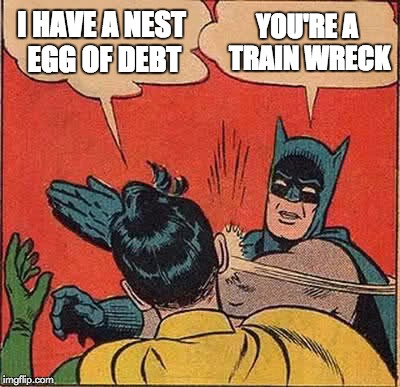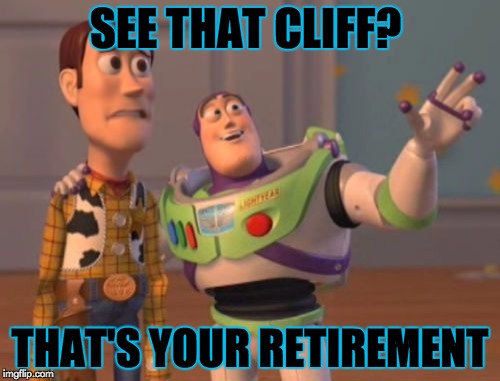How Debt Sets You Up for Failure
I’ve never been in major debt in my life, mainly for one overriding reason: I don’t like the idea of owing anyone money.
I’m in favor of good debt — such as getting a mortgage to buy a home, or a student loan to attend college, up to a certain point — but owing a company or someone money has always left me with a nagging feeling. I’m even happy to pay an annual fee for my rewards credit card so my family can use the reward points for free hotel rooms during vacations — but only because we pay the monthly bill off on time and don’t pay interest.
Here’s an example of how crazy I am about avoiding debt, even though it was only $20 from a friend:
In August I went with my daughter to her middle school for orientation, which included buying gym clothes. I mistakingly thought a credit card would be allowed to buy the items, so I left my checkbook at home and didn’t bring cash. When I found out that only cash or check were allowed, I borrowed $20 in cash from a friend who was there with their daughter so that I didn’t have to return to the school and buy the stuff later.
A few hours later, I made a point of going to an ATM to withdraw $20 and deliver it to my friend. It was an obligation I wanted to fulfill that day, partly because I wanted to thank them for the quick loan, and also so I wouldn’t forget to pay them later.
My point is that even with a small amount of debt between friends, debt can be a bad habit that can easily get worse before it gets better.
Saving for a nest egg of debt
I have a desk calendar from The Onion, the satirical news site, and a recent entry had this headline:
“Couple Has Nest Egg Of Debt To Make Sure They’ve Got Some Money To Owe Down The Road.”
Beneath it was a short, funny story about a couple always having debt that will “hopefully provide us with a nice chunk of debt we can dig into later on if we happen to run into any unexpected prosperity.”
If they stuck to their debt plan, “they would have enough outstanding payments stashed away to not only retire in debt but also to ensure that their children could inherit some of their debt as well.”
While it’s just silly satire, The Onion story makes a few points that really stand out for me:
Debt hinders prosperity
Saving a “nest egg” of debt for retirement sounds preposterous, but it’s what some people are essentially doing by allowing themselves to be in debt as they prepare for retirement.
Think about what you could do if you did’t have debt to deal with. Yes, you could easily spend it on more things — clothes, dinner out, a new car, travel — or you could allow yourself to be prosperous.
With debt, any unexpected prosperity that does come along — such as a bonus at work, tax refund or an unexpected new client — will put a cloud over the extra money that just came your way. Paying off debt with such a bonus is a smart move — but not having that debt when a bonus comes around could lead to a lot more prosperity down the road.
Don’t give debt to your kids
Debt can’t be inherited, so that isn’t something to be worried about. Your hospital bills at the end of your life don’t have to be paid for by your heirs.
But constantly trying to tackle debt and taking on more debt is a lesson you don’t want to teach your children.
It goes back to the idea of hindering your future prosperity by always having debt. It can be a constant struggle to get ahead in life and have the money you need to improve your life if you’re always taking on more debt.
I bought three websites this year to help me earn some passive income, and I vowed not to buy more websites until the ones I have are profitable. I’ve had an opportunity recently to buy another site that should lead to some decent passive income, but I’ve followed by own advice and decided not to buy until I’m out of the hole with the other sites, including this one.
It’s debt I could probably afford, but I want to continue paying myself back for the outlay for the other websites until they’ve paid for themselves.
No one seriously grows their debt so that they’ll be in debt during retirement, but that’s essentially what people are doing by taking on more debt and barely paying off their debt when they’re young and working.
If that doesn’t put a sinking feeling in your gut, as it does mine, try imagining your retirement every time you pull out your credit card.







One Comment